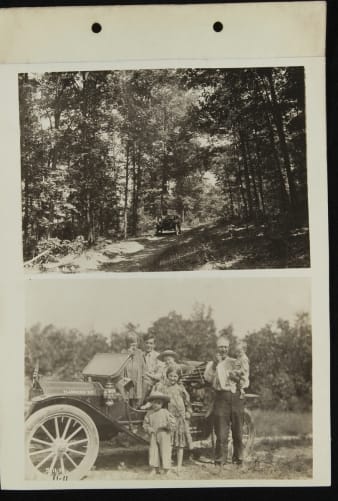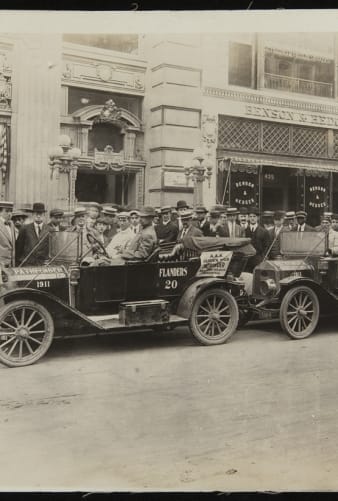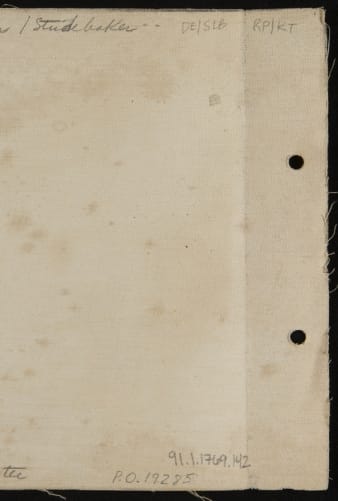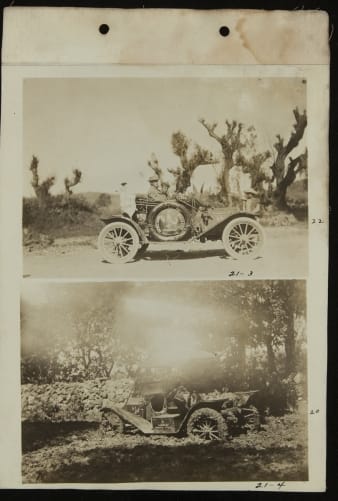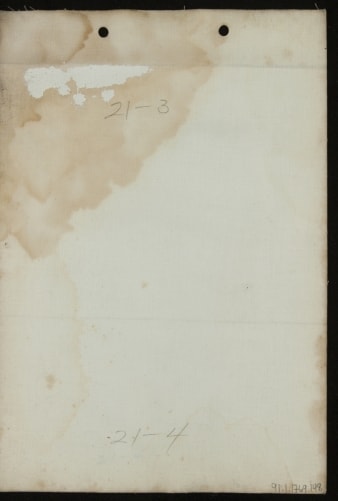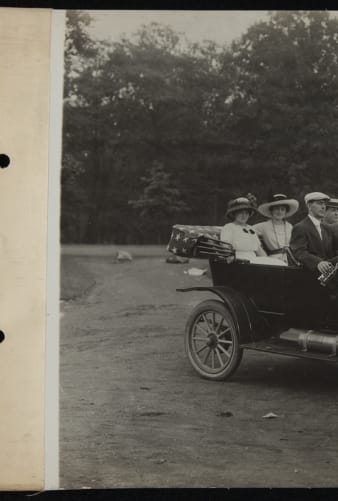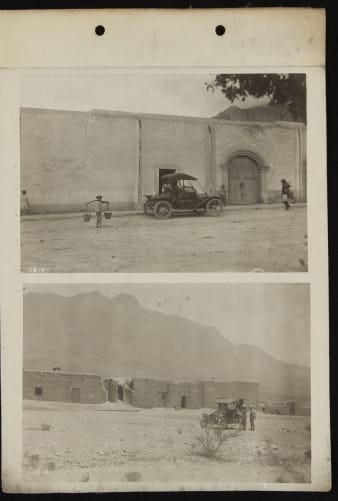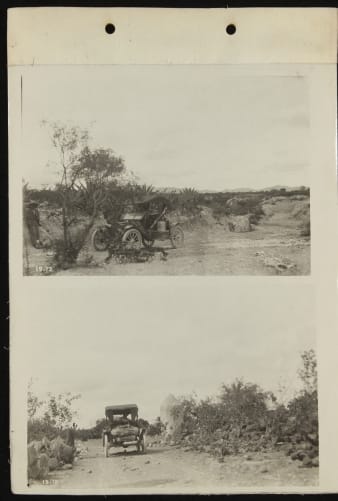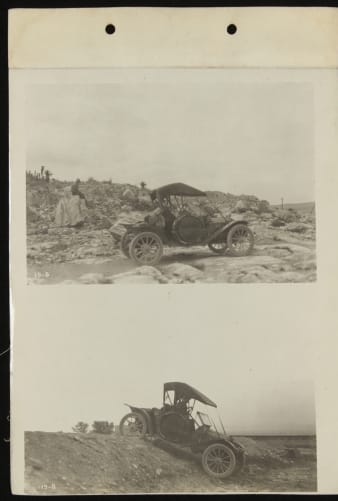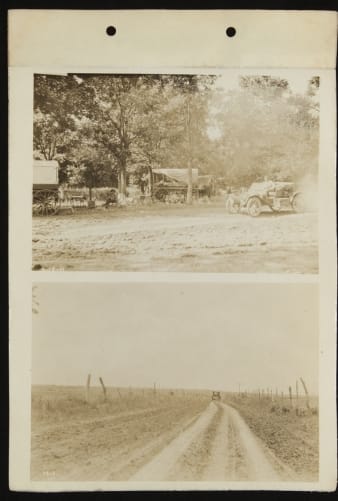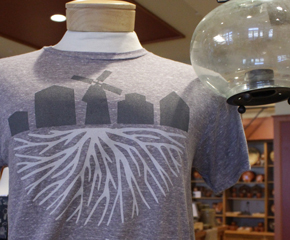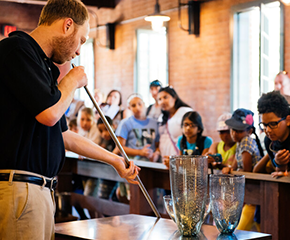
E-M-F, Flanders, and Studebaker Photographs
Mainly unlabeled and undated photographs that detail the history of E-M-F and Flanders automobiles, both of which were incorporated into Studebaker Brothers manufacturing Company in 1912 and sold under that name. Also depicted is automotive production and shipping, images of automobile track racing, and photographic materials that promote the durability and reliability of E-M-F, Flanders and Studebaker vehicles.
Biographical / Historical Note
Automobile manufacturer Everitt-Metzger-Flanders Co. (E-M-F) began in 1908 intending to mass produce an automobile in a medium price range. The company was named for its three founders: Barney Everitt, successful Detroit automobile body-builder; William...
MoreAutomobile manufacturer Everitt-Metzger-Flanders Co. (E-M-F) began in 1908 intending to mass produce an automobile in a medium price range. The company was named for its three founders: Barney Everitt, successful Detroit automobile body-builder; William Metzger, premier Cadillac Motor Co. salesman; and Walter Flanders, who had previously worked as Henry Ford's first production manager at Ford Motor Company. LeRoy Pelletier, another former Ford Motor Co. employee, was named advertising manager. Soon after its founding, E-M-F established an alliance with another automobile manufacturer, the Studebaker Brothers Manufacturing Co. The partnership was for Studebaker to handle half of all E-M-F automobile sale, including all export business and all sales in the southwestern U.S.
By 1909, following a rift with the company, Everitt and Metzger and left the company to build their own car, the Everitt. They then sold their shares in E-M-F to Studebaker. Walter Flanders, having lost majority control of the company, then also aligned with Studebaker. Together, E-M-F and Studebaker, led by Flanders, began production of a new low-priced car that would compete directly with the Model T Ford, calling it the Flanders 20. By 1912, Studebaker Brothers Manufacturing Company and E-M-F were wholly combined, and by 1913 all new production E-M-F and Flanders vehicles were marketed as Studebakers. Years later, in 1921, Everitt, Metzger, Flanders and Pelletier reunited to build and market the Rickenbacker automobile. Studebaker Brothers Manufacturing Co. continued producing and selling automobiles successfully in America until 1966.
Note adapted from the following: - William E. Metzger. (2014, September 19). In Wikipedia, The Free Encyclopedia. Retrieved 20:30, January 28, 2015, from http://en.wikipedia.org/w/index.php?title=William_E._Metzger&oldid=626256351 - Walter Flanders. (2014, July 7). In Wikipedia, The Free Encyclopedia. Retrieved 20:31, January 28, 2015, from http://en.wikipedia.org/w/index.php?title=Walter_Flanders&oldid=615917186
LessScope and Content Note
The E-M-F, Flanders, and Studebaker photographs consists of 238 black-and-white photographic prints that were once part of an album, most of which are unlabeled and undated. The photographs provide excellent visual documentation of E-M-F and Flanders...
MoreThe E-M-F, Flanders, and Studebaker photographs consists of 238 black-and-white photographic prints that were once part of an album, most of which are unlabeled and undated. The photographs provide excellent visual documentation of E-M-F and Flanders automobiles, particularly the promotion of their durability and reliability, and include images of E-M-F 20, E-M-F 30, and Flanders 20 models. Researchers should note that some prints are water damaged.
Most photographs depict the use of the E-M-F 30 as the official vehicle chosen to perform a path finding tour in 1909. The tour went from Detroit to Denver via Minneapolis and Kansas City, and was sponsored by AAA and Charles J. Glidden (Pathfinder vehicles were judged on handling and performance on rough roads, steep hills, mountain trails, deep mud, and long distance runs rather than time). Other photographs depict similar Flanders 20 endurance runs in 1911; a Glidden sponsored tour on the East Coast; a pathfinder for the Pacific Highway Association to the Grand Canyon; a trip covering over 4,000 miles from Canada to Mexico entitled "Under Three Flags;" and images of the Tiedeman Trophy Race in Savannah, Georgia. The Tiedeman race was contested by a Flanders car holding a speed record of 84 mph and nicknamed Old Bullet.
There are also photographs depicting the production and shipment of automobiles, automotive workers, automobile track racing, roadside camping, and award ceremonies. Additional genres (often framing an automobile) include landscapes, waterscapes, mountainscapes, streetscapes, cityscapes, and an occasional group portrait.
LessCollection Details
Object ID: 91.1.1769.0
Inclusive Dates: circa 1910-1914
Size: 0.4 cubic ft. (1 box)
Language: English
Collection Access & Use
Item Location: Not Currently On Exhibit
Access Restrictions: The materials are available for research.
Credit: From the Collections of The Henry Ford.
Digitized Artifacts From This Collection
In many cases, not all artifacts have been digitized.
Contact us for more information about this collection.
E-M-F, Flanders, Studebaker Photographs, ca. 1910-1914 -- Item 33
Artifact
Photographic print
Summary
Founded in 1852, Studebaker was the world's largest manufacturer of horse-drawn vehicles by 1900. It entered the automobile business with understandable caution. Studebaker contracted with the Everitt-Metzger-Flanders Company in 1908 to sell E-M-F cars through Studebaker's extensive network of wagon dealers. Studebaker ultimately purchased E-M-F and its facilities and began building gasoline-powered cars under the Studebaker name for 1913.
Object ID
91.1.1769.33
Credit
From the Collections of The Henry Ford.
Location
By Request in the Benson Ford Research Center
Get more details in Digital Collections at:
E-M-F, Flanders, Studebaker Photographs, ca. 1910-1914 -- Item 33
What is The Henry Ford?
The national attraction for discovering your ingenuity while exploring America’s spirit of innovation. There is always much to see and do at The Henry Ford.
E-M-F, Flanders, Studebaker Photographs, ca. 1910-1914 -- Item 142
Artifact
Photographic print
Summary
Founded in 1852, Studebaker was the world's largest manufacturer of horse-drawn vehicles by 1900. It entered the automobile business with understandable caution. Studebaker contracted with the Everitt-Metzger-Flanders Company in 1908 to sell E-M-F cars through Studebaker's extensive network of wagon dealers. Studebaker ultimately purchased E-M-F and its facilities and began building gasoline-powered cars under the Studebaker name for 1913.
Object ID
91.1.1769.142
Credit
From the Collections of The Henry Ford.
Location
By Request in the Benson Ford Research Center
Get more details in Digital Collections at:
E-M-F, Flanders, Studebaker Photographs, ca. 1910-1914 -- Item 142
What is The Henry Ford?
The national attraction for discovering your ingenuity while exploring America’s spirit of innovation. There is always much to see and do at The Henry Ford.
E-M-F, Flanders, Studebaker Photographs, ca. 1910-1914 -- Item 148
Artifact
Photographic print
Summary
Founded in 1852, Studebaker was the world's largest manufacturer of horse-drawn vehicles by 1900. It entered the automobile business with understandable caution. Studebaker contracted with the Everitt-Metzger-Flanders Company in 1908 to sell E-M-F cars through Studebaker's extensive network of wagon dealers. Studebaker ultimately purchased E-M-F and its facilities and began building gasoline-powered cars under the Studebaker name for 1913.
Object ID
91.1.1769.148
Credit
From the Collections of The Henry Ford.
Location
By Request in the Benson Ford Research Center
Get more details in Digital Collections at:
E-M-F, Flanders, Studebaker Photographs, ca. 1910-1914 -- Item 148
What is The Henry Ford?
The national attraction for discovering your ingenuity while exploring America’s spirit of innovation. There is always much to see and do at The Henry Ford.
E-M-F, Flanders, Studebaker Photographs, ca. 1910-1914 -- Item 166
Artifact
Photographic print
Summary
Founded in 1852, Studebaker was the world's largest manufacturer of horse-drawn vehicles by 1900. It entered the automobile business with understandable caution. Studebaker contracted with the Everitt-Metzger-Flanders Company in 1908 to sell E-M-F cars through Studebaker's extensive network of wagon dealers. Studebaker ultimately purchased E-M-F and its facilities and began building gasoline-powered cars under the Studebaker name for 1913.
Object ID
91.1.1769.166
Credit
From the Collections of The Henry Ford.
Location
By Request in the Benson Ford Research Center
Get more details in Digital Collections at:
E-M-F, Flanders, Studebaker Photographs, ca. 1910-1914 -- Item 166
What is The Henry Ford?
The national attraction for discovering your ingenuity while exploring America’s spirit of innovation. There is always much to see and do at The Henry Ford.
E-M-F, Flanders, Studebaker Photographs, ca. 1910-1914 -- Item 173
Artifact
Photographic print
Summary
Founded in 1852, Studebaker was the world's largest manufacturer of horse-drawn vehicles by 1900. It entered the automobile business with understandable caution. Studebaker contracted with the Everitt-Metzger-Flanders Company in 1908 to sell E-M-F cars through Studebaker's extensive network of wagon dealers. Studebaker ultimately purchased E-M-F and its facilities and began building gasoline-powered cars under the Studebaker name for 1913.
Object ID
91.1.1769.173
Credit
From the Collections of The Henry Ford.
Location
By Request in the Benson Ford Research Center
Get more details in Digital Collections at:
E-M-F, Flanders, Studebaker Photographs, ca. 1910-1914 -- Item 173
What is The Henry Ford?
The national attraction for discovering your ingenuity while exploring America’s spirit of innovation. There is always much to see and do at The Henry Ford.
E-M-F, Flanders, Studebaker Photographs, ca. 1910-1914 -- Item 174
Artifact
Photographic print
Summary
Founded in 1852, Studebaker was the world's largest manufacturer of horse-drawn vehicles by 1900. It entered the automobile business with understandable caution. Studebaker contracted with the Everitt-Metzger-Flanders Company in 1908 to sell E-M-F cars through Studebaker's extensive network of wagon dealers. Studebaker ultimately purchased E-M-F and its facilities and began building gasoline-powered cars under the Studebaker name for 1913.
Object ID
91.1.1769.174
Credit
From the Collections of The Henry Ford.
Location
By Request in the Benson Ford Research Center
Get more details in Digital Collections at:
E-M-F, Flanders, Studebaker Photographs, ca. 1910-1914 -- Item 174
What is The Henry Ford?
The national attraction for discovering your ingenuity while exploring America’s spirit of innovation. There is always much to see and do at The Henry Ford.
E-M-F, Flanders, Studebaker Photographs, ca. 1910-1914 -- Item 181
Artifact
Photographic print
Summary
Founded in 1852, Studebaker was the world's largest manufacturer of horse-drawn vehicles by 1900. It entered the automobile business with understandable caution. Studebaker contracted with the Everitt-Metzger-Flanders Company in 1908 to sell E-M-F cars through Studebaker's extensive network of wagon dealers. Studebaker ultimately purchased E-M-F and its facilities and began building gasoline-powered cars under the Studebaker name for 1913.
Object ID
91.1.1769.181
Credit
From the Collections of The Henry Ford.
Location
By Request in the Benson Ford Research Center
Get more details in Digital Collections at:
E-M-F, Flanders, Studebaker Photographs, ca. 1910-1914 -- Item 181
What is The Henry Ford?
The national attraction for discovering your ingenuity while exploring America’s spirit of innovation. There is always much to see and do at The Henry Ford.
E-M-F, Flanders, Studebaker Photographs, ca. 1910-1914 -- Item 184
Artifact
Photographic print
Summary
Founded in 1852, Studebaker was the world's largest manufacturer of horse-drawn vehicles by 1900. It entered the automobile business with understandable caution. Studebaker contracted with the Everitt-Metzger-Flanders Company in 1908 to sell E-M-F cars through Studebaker's extensive network of wagon dealers. Studebaker ultimately purchased E-M-F and its facilities and began building gasoline-powered cars under the Studebaker name for 1913.
Object ID
91.1.1769.184
Credit
From the Collections of The Henry Ford.
Location
By Request in the Benson Ford Research Center
Get more details in Digital Collections at:
E-M-F, Flanders, Studebaker Photographs, ca. 1910-1914 -- Item 184
What is The Henry Ford?
The national attraction for discovering your ingenuity while exploring America’s spirit of innovation. There is always much to see and do at The Henry Ford.
E-M-F, Flanders, Studebaker Photographs, ca. 1910-1914 -- Item 187
Artifact
Photographic print
Summary
Founded in 1852, Studebaker was the world's largest manufacturer of horse-drawn vehicles by 1900. It entered the automobile business with understandable caution. Studebaker contracted with the Everitt-Metzger-Flanders Company in 1908 to sell E-M-F cars through Studebaker's extensive network of wagon dealers. Studebaker ultimately purchased E-M-F and its facilities and began building gasoline-powered cars under the Studebaker name for 1913.
Object ID
91.1.1769.187
Credit
From the Collections of The Henry Ford.
Location
By Request in the Benson Ford Research Center
Get more details in Digital Collections at:
E-M-F, Flanders, Studebaker Photographs, ca. 1910-1914 -- Item 187
What is The Henry Ford?
The national attraction for discovering your ingenuity while exploring America’s spirit of innovation. There is always much to see and do at The Henry Ford.
